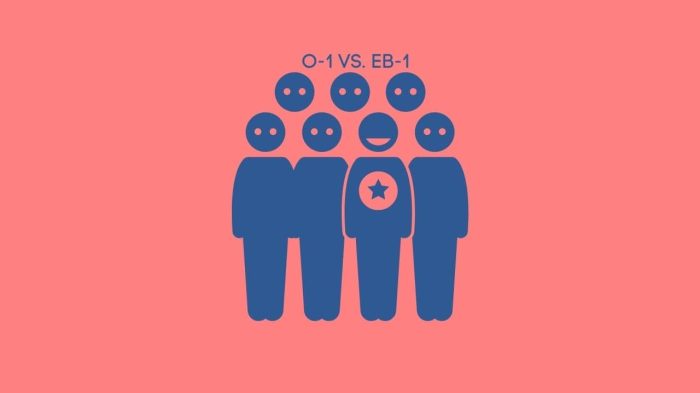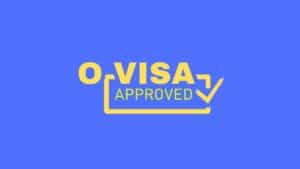Introduction
Suppose you intend to reside in the US. In that case, your primary target should be to get your immigrant visa approved by the authorities. Many individuals come to the US on an employment visa. The US always welcomes aliens who possess extraordinary ability to come and work in the US. If you have that skill, you can either apply for an O-1 Visa or an EB-1 Visa. At times, it becomes crucial to know the difference between these two visas as that can impact your future stay in the United States. This article will explain the key differences between O-1 and EB-1A visa (Alien of Extraordinary ability).
What is an O-1 Visa?
The O-1 Visa is a nonimmigrant visa category for individuals who possess extraordinary sciences, arts, education, business, or athletics abilities. It also applies to those who have a demonstrated record of extraordinary achievement in the motion picture or television industry and have been recognized nationally or internationally for those achievements.
What is an EB-1A Visa?
An EB-1 visa is an immigrant visa suitable for individuals coming to the US-based on their extraordinary skills. There are also two other categories of an EB-1 visa; one is for Outstanding Professors and Researchers, and the other is for certain Multinational Managers and executives. For this article, we will restrict ourselves to the “aliens with extraordinary ability” category.
O-1 vs. EB-1: What are Differences Between O-1 and Eb-1a Visa?
Both an O-1 visa and an EB-1A visa are for those who possess extraordinary skills in their field of expertise. However, they have the following differences that you should know:
Term of Stay
If the USCIS approves your O-1 visa, you get a maximum stay of three (3) years in the US. However, you can apply for an extension of your stay, which is provided in 1-year increments.
An EB-1 visa provides you with an option of permanent residency. After USCIS approves your EB-1 (Form I-140), you can get your Form I-485 approved by the USCIS and become eligible for a green card.
Sponsorship Requirement
Your US employer must sponsor you to bring you to the US on an O-1 Visa. Your employer has to file Form I-129 (Petition for nonimmigrant workers) and submit all documentary evidence.
However, you may apply for a visa yourself by filing Form I-140 (Petition for Alien Worker) if you are coming to the US on an EB-1A visa. No US sponsor is required for the visa.
Eligibility Requirements
Since EB-1 is an immigrant visa, it is not surprising that the standards to be eligible for an EB-1 visa are higher as compared to an O-1 nonimmigrant visa. In both the visas, the key determinants are the extraordinary skills of the applicant, but to what degree makes them unique.
To become eligible for an O-1 visa, you have to show the following piece of evidence to prove your extraordinary ability-

- Through sustained national or international acclaim in sciences, education, business, or athletics.
- For arts, you can show evidence of distinction and your recognition in the field.
- To qualify for the motion picture or television industry category, you have to demonstrate extraordinary achievement. This is by showing evidence of your recognition in the motion picture or television industry that is above the normal.
The evidence is typically shown as your recognition that is beyond the ordinary in your field.
You must fulfill three out of the ten criteria outlined by the USCIS to prove your extraordinary ability in the EB-1 category. Alternatively, you can provide evidence of a one-time achievement (i.e., Pulitzer, Oscar, Olympic Medal) in your field of expertise. The ten criteria are:
- Receipt of lesser nationally or internationally recognized prizes or awards for excellence
- Your membership in associations in the field which demand outstanding achievement of their members
- Published material about you in professional or major trade publications or other major media
- Evidence that you have been asked to judge the work of others, either individually or on a panel
- Original scientific, scholarly, artistic, athletic, or business-related contributions of major significance to the field
- Your authorship of scholarly articles in professional or major trade publications or other major media
- Display of your work at artistic exhibitions or showcases
- Your performance of a leading or critical role in distinguished organizations
- Evidence that you command a high salary or other significantly high remuneration concerning others in the field
- Your commercial successes in the performing arts
Domain Area
You can apply for an EB-1 visa if you can prove your extraordinary skills in the sciences, arts, education, business, or athletics.
However, the O-1 visa provides you with additional subject areas than sciences, arts, education, business, or athletics, i.e., if you have demonstrated a record of extraordinary achievement in the motion picture or television industry, you can apply for an O-1 visa.
Rights Granted to Family
The family of an O-1 visa holder has to apply for an O-3 visa as dependents separately. They will not be provided with work permission in the United States as O-1 dependents; however, children under 21 can come to the US school on an O-3 Visa.
The spouses and dependents (children under 21 years of age) of an EB-1 visa holder are granted a green card upon approval. They can work in the United States, unlike an O-1 visa holder’s dependents. They may also file for citizenship after they become eligible.
Conclusion
Although the extent of rights on an EB-1 Visa is greater than an O-1 visa, the burden to prove, your extraordinary ability is also higher. You have to choose which Visa suits you better and then apply for that Visa. Suppose you face trouble in deciding which Visa has the highest chances of getting approved. In that case, you can consult our immigration experts. Immigration Attorneys at Sethi and Mazaheri law firm are well equipped with their subject knowledge and have much experience dealing with practical cases. They will assist you with your application and will suggest the best course of action for you.








 by Prozco®
by Prozco®